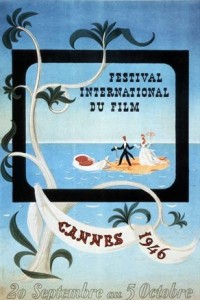
Sergei Iosifovich Yutkevich was a Soviet film director and screenwriter. He was a People's Artist of the USSR (1962) and a Hero of Socialist Labour (1974).

The 23rd Cannes Film Festival ran from 3 to 18 May 1970. This year, Robert Favre LeBret, the founder of the festival, decided not to include any films from Russia and Japan. He was tired of the "Slavic spectacles and Japanese samurai flicks.". The Russians took back their juror Sergei Obraztsov and left the jury panel with only eight members.

The 3rd Cannes Film Festival was held from 2 to 17 September 1949. The previous year, no festival had been held because of financial problems.

The 24th Cannes Film Festival was held from 12 to 27 May 1971. The Palme d'Or went to The Go-Between by Joseph Losey.

The 4th Cannes Film Festival was held from 3 to 20 April 1951. The previous year, no festival had been held because of financial reasons. In 1951, the festival took place in April instead of September to avoid direct competition with the Venice Film Festival.

The 6th Cannes Film Festival was held from 15 to 29 April 1953. The Grand Prix of the Festival went to The Wages of Fear by Henri-Georges Clouzot.
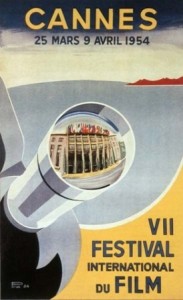
The 7th Cannes Film Festival was held from 25 March to 9 April 1954. With Jean Cocteau as president of the jury, the Grand Prix went to the Gate of Hell by Teinosuke Kinugasa. The festival opened with Le Grand Jeu by Robert Siodmak. This was the last festival with a predominantly French jury.

The 8th Cannes Film Festival was held from 26 April to 10 May 1955. The Golden Palm went to the US film Marty by Delbert Mann. The festival opened with Du rififi chez les hommes by Jules Dassin and closed with Carmen Jones by Otto Preminger.

The 9th Cannes Film Festival was held from 23 April to 10 May 1956. The Palme d'Or went to The Silent World by Jacques-Yves Cousteau and Louis Malle. The festival opened with Marie-Antoinette reine de France, directed by Jean Delannoy and closed with Il tetto by Vittorio De Sica.

The 11th Cannes Film Festival was held from 2 to 18 May 1958. The Palme d'Or went to The Cranes are Flying by Mikhail Kalatozov.

The 12th Cannes Film Festival was held from 30 April to 15 May 1959. The Palme d'Or went to the Orfeu Negro by Marcel Camus. The festival opened with Les Quatre Cents Coups, directed by François Truffaut and closed with The Diary of Anne Frank, directed by George Stevens.
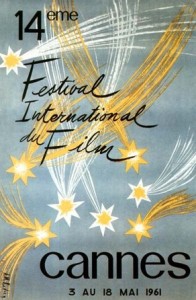
The 14th Cannes Film Festival was held from 3 to 18 May 1961. The Palme d'Or went to the Une aussi longue absence, directed by Henri Colpi and Viridiana, directed by Luis Buñuel. The festival opened with Che gioia vivere, directed by René Clément.

The 17th Cannes Film Festival was held from 29 April to 14 May 1964. On this occasion, the Palme d’Or was renamed "Grand Prix du Festival International du Film", a name that remained in use through 1974, after which it became the Palme d'Or again.

The 18th Cannes Film Festival was held from 3 to 16 May 1965. Olivia de Havilland became the first woman president of the jury.
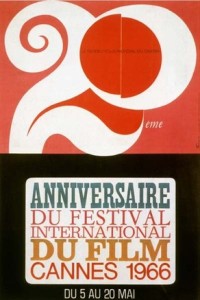
The 19th Cannes Film Festival was held from 5 to 20 May 1966. To honour the festival's 20th anniversary, a special prize was given.

The 20th Cannes Film Festival was held from 27 April to 12 May 1967. The Grand Prix du Festival International du Film went to the Blowup by Michelangelo Antonioni. The festival opened with J'ai tué Raspoutine, directed by Robert Hossein and closed with Batouk, directed by Jean Jacques Manigot.
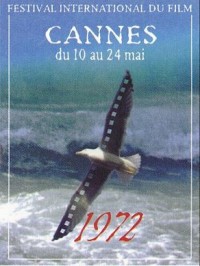
The 25th annual Cannes Film Festival was held from 4 to 19 May 1972. The Palme d'Or went to the Italian films The Working Class Goes to Heaven by Elio Petri and The Mattei Affair by Francesco Rosi.

The 26th Cannes Film Festival was held from 10 to 25 May 1973. The Grand Prix du Festival International du Film went to Scarecrow by Jerry Schatzberg and The Hireling by Alan Bridges. At this festival two new non-competitive sections were added: 'Étude et documents' and 'Perspectives du Cinéma Français'.

The 30th Cannes Film Festival was held from 13 to 27 May 1977. The Palme d'Or went to the Padre Padrone by Paolo and Vittorio Taviani. A new non-competitive section, "Le Passé composé", is held at this festival only and focuses on compilations. This section, along with sections "Les Yeux fertiles" and "L'Air du temps" of the previous two years, were integrated into Un Certain Regard in 1978.

The 43rd Cannes Film Festival was held from 10 to 21 May 1990. The Palme d'Or went to Wild at Heart by David Lynch.
